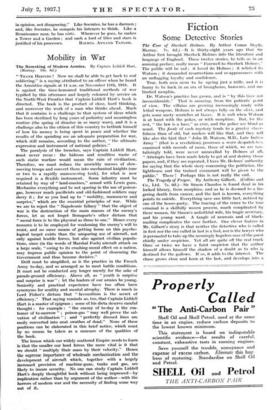Fiction
Some Detective Stories
The Case of Sherlock Holmes. By Arthur Conan Doyle. Murray. 7s. 6d.)—It is thirty-eight years ago that Sir Arthur first brought Sherlock Holmes into the literature and language of England. These twelve stories, he tells us in an amusing preface, really mean " Farewell to Sherlock Holmes." The public will be sad ; it loved its Holmes ; it relished its Watson ; it demanded resurrections and re-appearances with an unflagging loyalty and confidence.
True, both men seem to be ageing just a trifle, and it is funny to be back in an era of broughams, hansoms, and un- limited morphia.
Dr. Watson's practice has grown, and is " by this time not inconsiderable." That is amazing, from the patients' point of view. The villains are growing increasingly ready with lethal weapons, Holmes is not always fully on the alert, and gets some nasty scratches at times. It is well when Watson is at hand with the poker, or with morphine. But, for the rest, " the law is a hass," as ever, and the police are blind as usual. The finale of each mystery tends to a greater cheer- fulness than of old, but readers will like that, and they will like also the hint that " John H. Watson, M.D., Late Indian Army " (that is a revelation), possesses a worn despatch-box crammed with records of cases, three of which, we are tan- talizingly told, were never unravelled by Holmes at all. " Attetnpts have been made lately to get at and destroy those papers, and, if they are repeated, I have Mr. Holmes' authority for saying that the whole story concerning the politician, the lighthouse and the trained cormorant will be given to the public." There ! Perhaps this is not really the end.














































 Previous page
Previous page